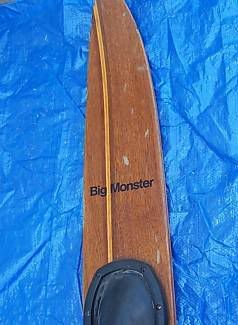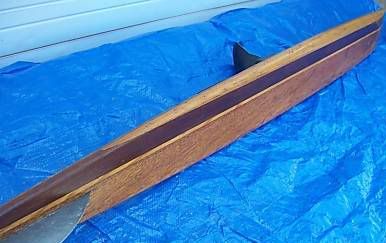I have an old wooden ski master slalom, i would say from the early 70s and i am getting my dads old jet boat out and thought it would be cool to kick it old school on the wooden slalom behind the old boat, the problem is the poly on the bottom of the ski is all cracked and in the middle a lot of it has fallen off, is there a stripper than i can use to get it off, or what are my options?
Announcement
Collapse
No announcement yet.
Wooden ski refinishing
Collapse
X
-
Tigé Expert
- Mar 2008
- 1396
- The Sunshine State
- 2000 Tige 21I Riders Edition, 1980 MC Stars and Stripes


 This thread reminds me of my uncle's old Cypress Gardens Big Monster that we left on the swim platform one afternoon. Never to be seen again. We just sanded it down and re-finished it with a clear polyurethane. You should be good with that after sanding it down a bit.
"I feel sorry for people that don't drink, when they wake up in the morning, that's as good as they're gonna feel all day" - Frank Sinatra
This thread reminds me of my uncle's old Cypress Gardens Big Monster that we left on the swim platform one afternoon. Never to be seen again. We just sanded it down and re-finished it with a clear polyurethane. You should be good with that after sanding it down a bit.
"I feel sorry for people that don't drink, when they wake up in the morning, that's as good as they're gonna feel all day" - Frank Sinatra
Comment
-
I have half a dozen Cypress garden woodies.I usually restore a few in the winter to keep me entertained.For starters you need to strip the old ski with sand paper(I start with 80 grit and finish with 180).They make a wood bleach that brings the color back real nice.After the bleach I brush several coats of apoxy sanding between each.I have one at my shop just about finished,ill snap some pics tommorow.NC//OKC\\
Comment
-
Tigé Expert
- Mar 2008
- 1396
- The Sunshine State
- 2000 Tige 21I Riders Edition, 1980 MC Stars and Stripes
UPDATE!! HELP NEEDED
Ok, long story short after a couple years of searching the web I found a replacement "Big Monster" ski on ebay, I left the old one on the swim platform years ago and the rest is history. Below are some pics of the new ski. The bottom is in excellent shape, however, the top has a few dings. I need advice on how to fill in these dings on the ski before I refinish it. They aren't that deep, less than a 1/16th but you can tell they are there. What should I use to fill these in, surely wood putty is not an option, if anybody has done this before I would appreciate the input. Thanks

 "I feel sorry for people that don't drink, when they wake up in the morning, that's as good as they're gonna feel all day" - Frank Sinatra
"I feel sorry for people that don't drink, when they wake up in the morning, that's as good as they're gonna feel all day" - Frank Sinatra
Comment
-
Supreme Tigé Master
- Apr 2007
- 12007
- Lake Carl Blackwell, Stilly, USA
- 54 Bellcraft, 56 Burchcraft, 61 LoneStar, 75 Catalina 27
Sikkens Cetol is a best solution for these old teak/mahogany sticks.
Remove all hardware, sand and smooth. Then with a rag liberally apply acetone as a solvent to get the oils out of the wood. Wipe with clean rag surfces until you quit getting orange transfer from ski to rag. That orange is the wood's oil. Remove that or any finish will not stick well.
Get your Cetol, I use the marine version with the UV stabililzers in it rather than the Marine Clear Gloss, but if you store the ski indoors the gloss clear is prettier. Stir, do not shake to mix the Cetol.
Then brush on 4-5 coats of the Cetol using a good foam brush. Do not sand until after the second or third coat, and then use only like 400 or 600 grit, just to know down any raised hairs. Add coats as necessary to get the slickness you desire.
The cool thing about Cetol is assuming no damamge to the surface, next year you can add a coat with no sanding, and do that annually as long as you do not damamge the finish too bad.
Cetol is unique; it is easier to apply than varnish, and does not need sanding for successful application of coats. Sanding is for cosmetic smoothness only. Cetol moves and breathes with the wood ensuring that any water that does get in as a result of a nick or chip will come back out through the finish rather than bubbling it or peeling it.
I use it lots on my old wood boat restorations.It's not an optical illusion.
It just looks like one.....
Comment
-
Tigé Expert
- Mar 2008
- 1396
- The Sunshine State
- 2000 Tige 21I Riders Edition, 1980 MC Stars and Stripes
Originally posted by philwsailz View PostSikkens Cetol is a best solution for these old teak/mahogany sticks.
Remove all hardware, sand and smooth. Then with a rag liberally apply acetone as a solvent to get the oils out of the wood. Wipe with clean rag surfces until you quit getting orange transfer from ski to rag. That orange is the wood's oil. Remove that or any finish will not stick well.
Get your Cetol, I use the marine version with the UV stabililzers in it rather than the Marine Clear Gloss, but if you store the ski indoors the gloss clear is prettier. Stir, do not shake to mix the Cetol.
Then brush on 4-5 coats of the Cetol using a good foam brush. Do not sand until after the second or third coat, and then use only like 400 or 600 grit, just to know down any raised hairs. Add coats as necessary to get the slickness you desire.
The cool thing about Cetol is assuming no damamge to the surface, next year you can add a coat with no sanding, and do that annually as long as you do not damamge the finish too bad.
Cetol is unique; it is easier to apply than varnish, and does not need sanding for successful application of coats. Sanding is for cosmetic smoothness only. Cetol moves and breathes with the wood ensuring that any water that does get in as a result of a nick or chip will come back out through the finish rather than bubbling it or peeling it.
I use it lots on my old wood boat restorations.
I definitely like this approach Phil, do you have any suggestions for the small dings (as far as filling them in), some have suggested epoxy resin then sanding that down"I feel sorry for people that don't drink, when they wake up in the morning, that's as good as they're gonna feel all day" - Frank Sinatra
Comment
-
Supreme Tigé Master
- Apr 2007
- 12007
- Lake Carl Blackwell, Stilly, USA
- 54 Bellcraft, 56 Burchcraft, 61 LoneStar, 75 Catalina 27
Hmmm.. Epoxy would be the best way, short of trying to mill in a patch...Originally posted by Fast1911 View PostI definitely like this approach Phil, do you have any suggestions for the small dings (as far as filling them in), some have suggested epoxy resin then sanding that down
My biggest concern is that a thick patch of epoxy will be like a rock, and will not move with the wood. There is a remote chance it will pop, release, lift, etc... There is a cellulose-based system out there from a company called Smith's. C.P.E.S. is a water-thin celloluse-based primet that might improve adhesion of the epoxy. If you had a small batch of C.P.E.S. to put in the dings, your adhesion should be better. ALSO... They used to make a laminating and layup resin that would work, (done it) but I do not see it on their website. Their "Oak & Teak Epoxy Glue" might be the same stuff. If so, I would use it.
Again, the Smith's products are cellulose - based, so they are going to work with the wood much better, and will have that give and flex that will keep the patch from popping, in my opinion.
Here is the link to the "Oak & Teak Epoxy Glue" http://www.glueoakandteak.com/
Here is the link to the Smith's homepage:
http://www.smithandcompany.org/It's not an optical illusion.
It just looks like one.....
Comment
-
Tigé Expert
- Mar 2008
- 1396
- The Sunshine State
- 2000 Tige 21I Riders Edition, 1980 MC Stars and Stripes
Originally posted by philwsailz View PostHmmm.. Epoxy would be the best way, short of trying to mill in a patch...
My biggest concern is that a thick patch of epoxy will be like a rock, and will not move with the wood. There is a remote chance it will pop, release, lift, etc... There is a cellulose-based system out there from a company called Smith's. C.P.E.S. is a water-thin celloluse-based primet that might improve adhesion of the epoxy. If you had a small batch of C.P.E.S. to put in the dings, your adhesion should be better. ALSO... They used to make a laminating and layup resin that would work, (done it) but I do not see it on their website. Their "Oak & Teak Epoxy Glue" might be the same stuff. If so, I would use it.
Again, the Smith's products are cellulose - based, so they are going to work with the wood much better, and will have that give and flex that will keep the patch from popping, in my opinion.
Here is the link to the "Oak & Teak Epoxy Glue" http://www.glueoakandteak.com/
Here is the link to the Smith's homepage:
http://www.smithandcompany.org/
Thank you sir, will let ya know how I make out "I feel sorry for people that don't drink, when they wake up in the morning, that's as good as they're gonna feel all day" - Frank Sinatra
"I feel sorry for people that don't drink, when they wake up in the morning, that's as good as they're gonna feel all day" - Frank Sinatra
Comment
Comment